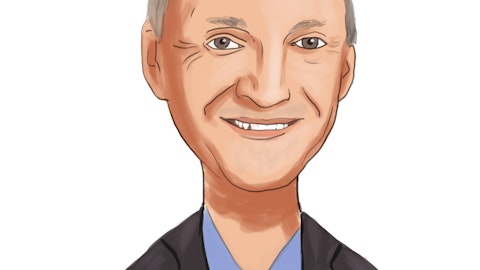Has — I would say, some of it, which are fully baked, is already captured like the vendor saving. But the other that I mentioned in my prepared remarks are work that I’m trying to do and have an ROI focus and more near-term focused. So CapEx, product development expenses that we are spending, looking at it from a project-by-project and the ROI of not having too long-term and near term is the cadence that I have just started. It’s still early, but I would say that’s the mindset I have. To answer your question, I feel at least 60 days in. It looks like a balanced budget to the best of my ability of understanding. But I feel more like what Chris said cautiously optimistic and there’s a lot more work to be done in the coming months. Chris, what would you…
Chris Fowler: I think you nailed it. And again, Sarah, I would say, definitely, between the optimistic and conservative, I would say, realistic is over the first 60 days is the way that I would categorize Vinay and appreciate that approach. Also, again, I’m going to say this for the second time. I love the fact that we’re giving the quarterly guidance, which I think helps everybody kind of keep track of our progress as we go — as we do know that it’s not quite a straight line on this transformation.
Operator: Our next question comes from Jesse Davis with Barclays. Please proceed with your question.
Stephanie Davis: Hey guys. Its Stephanie Davis from Barclays, but it’s okay, because I can have a new name as you guys have a new name too. Congrats on the rebranding. Now I was hoping to hear, Chris, you just came from a customer conference week on heels of that rebrand. So tell me, what’s the feedback? What are folks looking for? And what was the big area of demand that everyone talk about?
Operator: Hello, Chris, are you there? Okay. Please standby. [Technical Difficulty]. We’re welcoming back our speaker now to answer Jesse Davis from Barclays.
Chris Fowler: Correct. We’ll call her Stephanie. So Stephanie, thanks for the question. Like I was saying, we have been thrilled with the response to the rebrand on all fronts. And granted, it is early days. But obviously, you shared your e-mail. And obviously, you’ve been bugging us about this for quite a while. I think the sentiment from the street has been finally make it easier to tell the story. Our customers and our employees all seem to get it as well and appreciate the consolidation and the ease of how we talk about who we are. Going to the conference to Vas, what I would say that we saw kind of more than anything is that people are looking for insights. Insights on where there are opportunities for them to improve efficiencies, which lined up really nicely with — we had a little soft launch for an analytics platform that we’re driving out.
And so our thought is that step one is the technology that’s available to find the areas for improvement on the RCM side. And then obviously, with the opportunity for us to back that up with some services that come in, which I think is as much a top of mind to the customers as identifying what those problems are, what you’ve identified, then it’s about how do you solve them.
Stephanie Davis: When I think about a legacy industry that does a lot of insights work, I think in Nielsen, and we’ve got Vinay coming from there. Vinay, is there anything you’re seeing in that opportunity where you can kind of get some learnings from your past?
Vinay Bassi: I would say, Stephanie, past, not just Nielsen helps, but Avaya, banking everything has — I am learning from those experiences and utilizing it here. And the key one I would say is focus a lot on my controllable, which is cost structure and CapEx because that’s an influence I can make. And having lived through two private equity learnings, and they have been amazing teachers to me. So bringing that cadence of ROI mindset has helped me a lot, one. Secondly, in my Nielsen on having focused on revenue and all, it’s building that partnership with the business where accountability is an ownership share and that translation of bookings into revenue in the right — from a forecasting is the second one. And the third, which is not Nielsen, not Avaya, just who I am.
Cash is the only truth I’m going after. So improving my free cash flow is being the mantra that I’m committed to. So it’s a journey that I know might be longer, but every day, every month is where I’m looking to make a difference.
Stephanie Davis: Good to hear that. On the rev cycle side, I want to dig in a little bit. It looks like your cross-sales motion has been a little bit softer for the past few quarters. Is there any color on this? And then last one is a quick housekeeping one. I didn’t see an NPR metric. Is that going to be disclosed? Or is there anything you can share on that?
Chris Fowler: Yes, I’ll take the first and then let Vinay talk a little bit about the NPR and kind of the approach there. As it relates to the bookings and just kind of from a macro view, I would say we’re still very confident as it relates to the cross-sell opportunity. We continue to see that end of the market continue to have some momentum. I think it’s still — we still have the same challenges to an extent, while we’re seeing them turn down a little bit. It’s the economic impact of the jobs in the community. And it is the concept of outsourcing in general. Remember, we’re still talking about a market that 70%, 80% of it is still being done in-house, and there’s not a regulatory push to drive to this model. And so we’re still selling the idea of outsourcing before we’re selling TruBridge as the provider for that service.
And so we’re making great strides. That sales force has now been intact for a full-year. So they definitely have their feet under them. One on the value proposition of what it is that we’re selling, and two, building that relationship with our customers. And so we’re expecting to see that, as the year unfolds, continue to make progress there. And I’ll let Vinay talk a little bit about the NPR.




